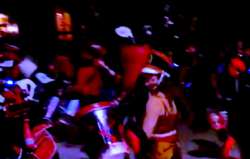NOLA 300 Music
Noise
It all became an aggressive gesture, a call into the night. We were still here.
Published: August 30, 2018
Last Updated: March 1, 2019

I grew up here, in the Spanish Stables building in the late seventies, when the raw, ragged edges of the Quarter still held sway. I played across the street from a fish market run by a man with one wooden leg and one white shrimp boot and skipped rope around the junkies nodding off on benches in Jackson Square. My artist parents had moved here before I was born, plunging into bohemian life. The beatniks and eccentrics who made the Quarter their home were the confederates of my childhood, a place where dinner parties turned into impromptu theatricals and any excuse sufficed for a costume, a parade, a flight of communal fancy. Mardi Gras to me was marching with the Society of St. Anne, that raucous krewe that wound through the Quarter, an exuberant parody of the staid parade of Rex, whom they went to meet on Canal Street.
But this year the Quarter was different. Military vehicles still prowled past intersections, silent and unwelcome as sharks, and it was as if I were an interloper, a stranger on these unfamiliar, chastened, silent streets.
Or at least, the streets had been silent until we came through–-the Noisician Coalition, a loose parade of marchers banging homemade instruments, garbage can lids, sirens, kazoos, broken amplifiers whose purposeful dissonance sounded like a junkyard imploding in not-quite-rhythmic succession. Its members were the next generation of artists and oddballs, punks and misfits, many of whom were from here as well or had lived here for years, and whose love of this town mirrored mine—a love whose natural expression, as any New Orleanian knows instinctively, is a loud, delirious, costumed procession.
The Noisician uniforms are an anarchic red and black. Dressed in corsets and goggles and top hats and fezzes, they look like the bedraggled military band of a clown army of some forgotten dystopia. The Noisicians had not only a party but also a kind of demented license, one that now felt restorative and necessary. The clanging, shrieking volume, the slightly lunatic finery: it all became an aggressive gesture, a call into the night. We were still here.
It’s ridiculous, I know. In a city this musical, where virtuosity thrums like a steady undercurrent, a high school marching band can deliver a near-religious experience and a guy on a corner with a horn can bring you to tears. To celebrate such deliberate incompetence sounds wrong, misguided. And yet.
We had started at the R Bar at midnight, winding through the dark streets, a noisy rebuttal to the hush of our bereaved city. We poured into Flanagan’s Pub on St. Peter Street, filling the room with clamor and a visceral, reverberating physicality. All at once, I needed to float on this roiling ocean of noise. So, I climbed onto the nearest table. I stomped my feet. I slammed my hand against the low ceiling. Beer foam sloshed from the bottle I was holding in a messy effervescence.
I remembered another night, one of many on Decatur Street, stomping in innocent abandon on a different bar to the Cramps’ “I Was a Teenage Werewolf.” Here I was: The gestures were the same, the bars, the neighborhood of my childhood and youth—but everything else had fractured, my whole world, our world, broken apart by the violence of a storm. In the aftermath, language and melody felt insufficient to speak to wide swaths of darkened blocks and spray-painted numbers. And it was only together, lost in this uncontainable, absurdist, glorious noise, that I could find comfort, grateful, finally at home again in the city.
Iris Martin Cohen grew up in the French Quarter of New Orleans. She holds an MFA from Columbia University and a certificate in Creative Nonfiction from the Graduate Center at the City University of New York. Her work has appeared in Lithub, Crime Reads, The New York Sun, The Austin Chronicle, and Habitus Magazine. Her first novel, The Little Clan, was published in April 2018 by Park Row books.
